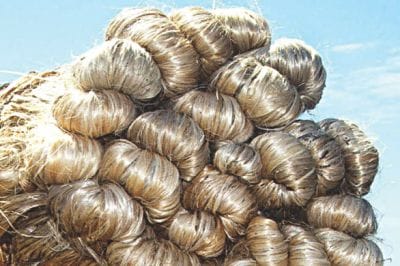Jute act largely not enforced

Over two years have passed since the enactment of a law for compulsory use of jute in packaging products, but the country's most gifted natural fibre still remains neglected in the local packaging sector.
"There has been no enforcement of the law passed by parliament two years back. There are polyethylene and polypropylene everywhere and hardly you'll find usage of jute in packaging products for the domestic market," said Director General of Bangladesh Jute Research Institute Dr Md Kamal Uddin at a policy research dissemination workshop on jute in the capital yesterday.
Had the "Mandatory Jute Packaging Act" been enforced strictly, he said, it would have created demand for 15 lakh bales of jute in the domestic market alone and could thereby boost the otherwise sluggish jute prices.
The government enacted the law in October 2010 to increase the use of environment-friendly jute goods instead of polythene or polypropylene bags. The law provides that initially products such as rice, paddy, wheat, sugar, seeds, fertiliser and saplings are to come under its purview and gradually other manufacturers are supposed to use packaging materials made of at least 75 percent jute fibre.
Presently, Bangladesh exports around 20 lakh bales of raw jute a year while it produces over 80 lakh bales. Local mills use 40 lakh bales to make yarn and jute goods, more than 80 percent of which is exported.
A number of growers from the jute-rich greater Faridpur region, who attended the workshop, identified volatility of jute price, dearth of quality jute seeds and problem of jute retting due to diminishing water bodies as the main impediments to further flourishing of the jute sector.
Traidcraft Exchange, a British development charity, along with local NGO Tarango organised the workshop to disseminate some policy research findings on jute, presented by Prof Dr M Harun-Ar-Rashid of Bangladesh Agriculture University. Traidcraft country director Kazi Shahed H Ferdous made the welcome address with Shamim Akhter, a member of the Planning Commission, chairing the session.
In the policy recommendations, the organisers urged the government to accommodate certain suggestions in the draft jute policy now lying with the cabinet division. The suggestions include fixation of minimum and maximum prices of raw jute, policy support for jute and diversified jute products and re-excavation of silted rivers, ponds and canals so that jute growers can ret jute properly.
Farmers attending the workshop said they suffer most for not getting adequate seeds in time from Bangladesh Agriculture Development Corporation, and have to depend mostly on imported Indian jute seeds.
Dr Md Abul Kashem, a director of Bangladesh Agricultural Research Council, stressed the need for strong farmers' organisations so that their voices reach the policy planners. Citing an example, Kashem said immediately after the recent hike in fuel prices, the government started negotiations with transport owners on hiking transport fare but there is no such initiative for farmers whose production costs would go up due to the hike in diesel price.

 For all latest news, follow The Daily Star's Google News channel.
For all latest news, follow The Daily Star's Google News channel. 




Comments